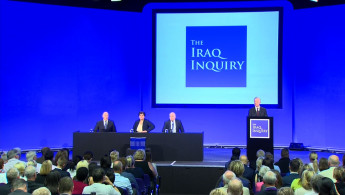'With you, whatever': Blair's ill-fated promise to Bush
"I will be with you, whatever," was former UK Prime Minister Tony Blair's cataclysmic promise to US President George Bush before the invasion of Iraq and revealed in the UK's Iraq Inquiry, published on Wednesday.
The result of the ill-planned invasion was hundreds of thousands of dead and millions homeless with the conequences still being played out in Iraq. This was highlighted on Sunday after a series of suicide bomb attacks in Baghdad claimed 250 more lives.
The fact that Blair's promise was made in 2002 - one year before the disastrous invasion of Iraq - shows his commitment to the US war plan from the outset.
The quote included in the report also highlighted a complete lack of enthusiasm by Bush and Blair to find a peaceful solution to the Iraq crisis.
The fact that no chemical weapons were found only added to the criticisms of Blair and Bush's invasion plan, and to many it became obvious that the real intention was to topple Saddam Hussein.
Years in the making
The Iraq Inquiry - compiled by retired civil servant John Chilcot - comes 13 years after the start of the war.
It was seven years in the making, and the 2.6 million word finding provides a damning assessment of Tony Blair's actions, and ultimately, his legacy during the march to war.
"By early January (2003), Mr Blair had also concluded that 'the likelihood was war'. At the end of January, Mr Blair accepted the US timetable for military action by mid-March," the report said.
"[He] set the UK on a path leading to diplomatic activity in the UN and the possibility of participation in military action in a way that would make it very difficult for the UK subsequently to withdraw its support for the US."
Despite Blair's previous attempts to portray himself as restlessly pursuing all peaceful routes to exhaustion, the findings prove otherwise.
"[Blair] did not press President Bush for definite assurances about US plans, did not consider or seek advice about whether the absence of a satisfactory plan called for reassessment of the terms of the UK's engagement and did not make agreement on such a plan a condition of UK participation in military action."
This led Blair to not only ignore the wishes of the people - with two million marching in London against the war - but also undermined the authority of the UN, the report found.
"In the absence of a majority in support of military action, we consider that the UK was, in fact, undermining the Security Council's authority".
 |
[Blair] set the UK on a path leading to diplomatic activity in the UN and the possibility of participation in military action in a way that would make it very difficult for the UK subsequently to withdraw its support for the US. |  |
"We have concluded that the UK chose to join the invasion of Iraq before the peaceful options for disarmament had been exhausted. Military action at that time was not a last resort".
On their own
The US and UK's decision to go to war without popular backing - or UN consent - would be fatal and catastrophic.
Bush and Blair appeared guided by false narratives and hasty intelligence judgements rather than prudent advice of policy makers, world leaders and experts.
"It is now clear that policy on Iraq was made on the basis of flawed intelligence and assessments. They were not challenged, and they should have been.
"Judgements about the severity of the threat posed by Iraq's weapons of mass destruction - WMD [weapons of mass destruction] - were presented with a certainty that was not justified."
Chilcot said spy chiefs "should have made clear to Mr Blair that the assessed intelligence had not established 'beyond doubt' either that Iraq had continued to produce chemical and biological weapons, or that efforts to develop nuclear weapons continued".
However, Chilcot was careful to say that there was no false evidence included in a intelligence report presented to the UK parliament.
"There is no evidence that intelligence was improperly included in the dossier or that Number 10 improperly influenced the text."
 |
Despite explicit warnings, the consequences of the invasion were underestimated. |  |
However, this will be of no consequence to the hundreds of thousands of Iraqis who lost loved ones during the war, or the millions without homes.
The ill-prepared assault on Iraq opened a Pandora's Box, and as the divide between the country's Sunni, Shia and Kurdish communities widened the more senseless the violence.
The chaos ensured the most ruthless and best armed factions came out on top.
The Islamic State group's rule over large northern territories and the Shia militias hold over the rest of the country ensured that the most reactionary forces benefited from the invasion.
This might have been prevented with a properly thought out post-invasion plan, the inquiry said, although the only failproof plan would have been a route to peace.
"Despite explicit warnings, the consequences of the invasion were underestimated. The planning and preparation for Iraq after Saddam [Hussein] were wholly inadequate."
Blair failed to integrate "UK military and civilian contributions" or look at risks that could appear once Iraq's fraught ethnic and religious "fault lines" were tested.
"The failures in the planning and preparations continued to have an effect after the invasion," the report said.
"The government's preparations failed to take account of the magnitude of the task of stabilising, administering and reconstructing Iraq."





 Follow the Middle East's top stories in English at The New Arab on Google News
Follow the Middle East's top stories in English at The New Arab on Google News


